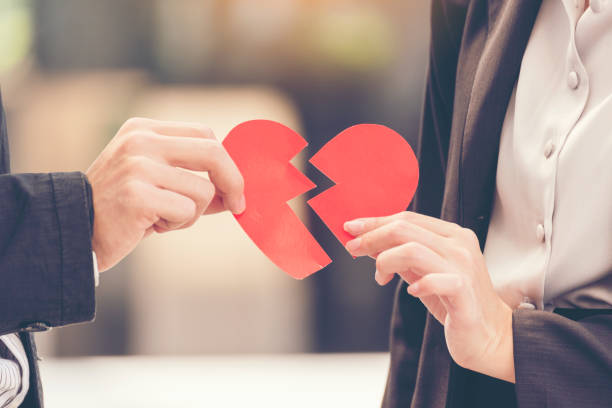Finding Your Way: Getting Over a Breakup and Finding Emotional Support
Breakups are rarely easy. They can leave you feeling lost, hurt, and overwhelmed by a sea of emotions. While there's no universal formula for healing after a breakup, there are some tried-and true strategies that can help you navigate this challenging process. In this comprehensive guide, we'll explore how to get over a breakup and, more importantly, how to find the emotional support you need to move forward.
The Importance of Grieving
One of the first steps in healing from a breakup is to allow yourself to grieve. It's essential to acknowledge and embrace your emotions, even if they are painful and negative. Pretending you're over the breakup when you're not can prolong the healing process.
Grief is a natural response to loss, and it's crucial to experience it fully. It might include feelings of sadness, anger, confusion, or even relief. By accepting and processing these emotions, you can begin to heal.
Connect with a Trusted Confidant
Talking about your feelings and experiences is a crucial part of healing. Find someone you trust, whether it's a friend, family member, or a therapist, and open up to them. Sharing your thoughts and emotions can provide clarity and relief during this difficult time.
When you express your feelings, you're not only sharing your burden but also gaining valuable insights. Friends and family can offer a different perspective and comfort you when you need it most. Professional therapists can provide guidance and coping strategies tailored to your situation.
Self-Care Is Key
In the midst of a breakup, taking care of yourself might be the last thing on your mind, but it's incredibly important. Self-care involves looking after your physical and emotional well-being. It's about nourishing your body and soul.
Here are some self-care practices to consider:
1. Eat Nutritious Meals: Proper nutrition plays a significant role in your overall well-being. Make sure you're fueling your body with healthy foods to maintain your energy levels and mood.
2. Get Adequate Sleep: Sleep is essential for emotional recovery. Ensure you're getting enough rest to allow your mind and body to rejuvenate.
3. Exercise Regularly: Physical activity can release endorphins, which are natural mood lifters. Engaging in regular exercise can help reduce stress and anxiety.
4. Engage in Activities You Enjoy: Pursue hobbies and activities that bring you joy. Whether it's reading, painting, or taking long walks, doing what you love can provide comfort and distraction.
Time Is Your Ally
Healing from a breakup is not a race; it's a journey that unfolds over time. Don't rush the process, and don't expect to feel better overnight. Be patient with yourself and allow time for the healing to take its natural course.
The passage of time allows you to gain perspective, distance yourself from the pain, and rebuild your life. Use this time to focus on self-improvement and personal growth.
The Healing Power of Human Touch
While the emotional support from friends and family is invaluable, the healing power of human touch should not be underestimated. Physical contact can release oxytocin, often referred to as the "love hormone." Oxytocin promotes feelings of connection and belonging, reduces stress, and can help you feel better during a challenging time.
Here are some specific ways to incorporate human touch into your healing process:
Hug a Friend or Family Member:
A warm embrace can do wonders for your emotional state. It releases oxytocin and reminds you that you're not alone.
Get a Massage:
A professional massage can help relax your muscles and reduce stress. It's an excellent way to experience human touch and unwind.
Cuddle with Your Pet:
If you have a pet, they can provide a tremendous source of comfort and human touch. Spend quality time cuddling with your furry friend.
Join a Group or Class:
Engaging in group activities, whether it's a fitness class or a hobby group, allows you to meet new people and experience positive physical contact, such as high-fives or hugs.
Dealing with Loving an Ex
Getting over an ex you still love is one of the hardest things to do. There is no easy answer, but here are some tips that may help:
Allow yourself to grieve:
It's important to acknowledge and allow yourself to feel your emotions, even if they are negative. Don't try to bottle them up or pretend that you're over your ex when you're not.
Cut off contact with your ex:
This may be difficult, but it's important to give yourself space to heal. This means avoiding contact on social media, text messages, phone calls, and in person.
Focus on yourself:
This is a time to focus on your own needs and wants. Do things that you enjoy and that make you feel good. This could include spending time with friends and family, pursuing your hobbies, or setting new goals for yourself.
Give yourself time:
Healing from a breakup takes time. Don't expect to feel better overnight. Be patient with yourself and allow the healing process to take its course.
The 5 Stages of a Breakup
The five stages of a breakup are:
Denial and shock: This is when you don't believe that the breakup is happening or that it's real.
Anger: You may be angry at your ex, at yourself, or at the world.
Bargaining: You may try to bargain with your ex or with yourself in an attempt to get back together.
Depression: This is when you feel sad, lost, and empty.
Acceptance: This is when you come to terms with the breakup and move on.
Not everyone goes through all five stages of a breakup, and the stages may not be linear. You may move back and forth between stages or experience them all at once.
How Long Does It Normally Take to Get Over a Breakup?
There is no set amount of time it takes to get over a breakup. The amount of time it takes will vary depending on the individual and the relationship. Factors such as the length of the relationship, the reason for the breakup, and the level of emotional attachment can all play a role in how long it takes to heal.
Some people may start to feel better within a few weeks or months, while others may need a year or more to fully heal. It's important to be patient with yourself and give yourself the time you need to grieve and move on.
The 7 Steps After a Breakup
The 7 steps after a breakup are:
Allow yourself to feel your emotions: It's important to acknowledge and allow yourself to feel your emotions, even if they are negative. Don't try to bottle them up or pretend that you're over your ex when you're not.
Talk to someone you trust: This could be a friend, family member, therapist, or anyone else you feel comfortable talking to about your feelings. Talking about what you're going through can help you to process your emotions and feel less alone.
Take care of yourself: This means eating healthy, getting enough sleep, and exercising regularly. It's also important to do things that you enjoy and that make you feel good.
Forgive yourself and your ex: This doesn't mean that you have to forget what happened, but it does mean letting go of any anger or resentment. Forgiveness is important for your own healing.
Learn from your relationship: Take some time to reflect on your relationship and what you learned from it. This can help you to make better choices in your future relationships.
Let go of the past: Once you've forgiven yourself and your ex and learned from your relationship, it's time to let go of the past. This means moving on and focusing on the present and the future.
Open yourself up to new love: When you're ready, open yourself up to new love. Don't compare your new relationships to your past relationship. Give yourself a chance to be happy with someone new.
Healing from a breakup takes time and effort. Be patient with yourself and give yourself the space you need to heal. Remember that every individual's journey is unique, and there's no one-size-fits-all approach to recovering from a breakup. As you navigate the emotional rollercoaster of a breakup, know that you have the strength and support to emerge stronger and more resilient on the other side.

